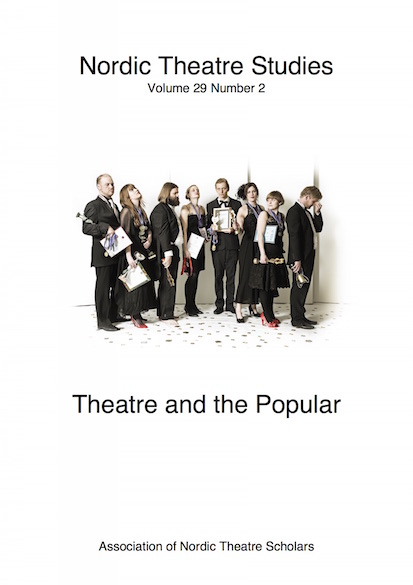Participation to the People! Locating the Popular in Rimini Protokoll’s Home Visit Europe
DOI:
https://doi.org/10.7146/nts.v29i2.104610Keywords:
Participatory theatre, Spectatorship, Audience participation, Rimini Protokoll, Home Visit Europe, Popular theatre, Participatory turn, Jacques Rancière, Theatre games.Abstract
Home Visit Europe by Rimini Protokoll is a performance without performers, only an audience taking part in a game in a private home. As such, it is one example of the participatory strategies that currently have a strong presence in contemporary theatre practices changing how we, as audience, engage with theatre. It is emblematic then that ‘participation’ is an emergent concept in theatre and performance studies with a rapidly growing body of work on the topic. This article sets out to explore how the idiom of the popular can shed light on some of the central issues in the discourse on participation: that is to say, the relationship between the artist and the audience, authorship, and the relationship between the aesthetic and the social dimension of participatory work. I will be using Home Visit Europe in the context of Bergen International Festival of 2015 as a case study, drawing on an audience research approach combined with a critical reading of the work. The conceptually stringent and tightly ordered dramaturgy of Home Visit Europe, where the audience take turns responding to a set of questions and tasks, demonstrates how problematic the concept of participation can be to describe theatre practices, as the term risks overstating the influence that the audience have over the aesthetic product. In this sense, contemporary participatory strategies resemble popular theatre’s conflict between established aesthetics, critical standards and popular grounding. A resemblance that brings the paper right to the core of the discourse on participation, which concerns the ideological ramifications of the ‘participatory turn’.References
Alston, Adam. 2016. Beyond Immersive Theatre. London: Palgrave Macmillan.
Bishop, Claire. Artificial Hells: Participatory Art and the Politics of Spectatorship. London & New York: Verso.
Breel, Astrid. 2015. “Audience Agency in Participatory Performance: A Methodology for Examining Aesthetic Experience.” Participations: Journal of Audi¬ence & Reception Studies 12:1, 368–387.
Carpentier, Nico. 2015. “Differentiating Between Access, Interaction and Participation.” Conjunctions: Transdisciplinary Journal of Cultural Participation 2:2, 9–28. DOI: 10.7146/tjcp.v2i2.23117.
Dreysse, Miriam and Florian Malzacher (eds.). 2008. Experts of the Everyday: The Theatre of Rimini Protokoll. Berlin: Alexander Verlag.
Fischer-Lichte, Erika. 2008. The Transformative Power of Performance: A New Aesthetics London & New York: Routledge.
Harvie, Jen. 2013. Fair Play: Art, Performance and Neoliberalism. Basingstoke & New York: Palgrave Macmillan.
Heddon, Deirdre. 2017. “The Cultivation of Entangled Listening.” In Anna Harpin and Helen Nicholson (eds.). Performance and Participation. Basingstoke & New York: Palgrave Macmillan, 19–40.
Shannon Jackson. 2011. Social Works. New York & London: Routledge.
Jenkins, Henry. 2014. “Rethinking ‘Rethinking Convergence/ Culture’.” Cultural Studies 28:2, 267–297. DOI: 10.1080/09502386.2013.801579.
Lehmann, Hans-Thies. 2006. Post-Dramatic Theatre. London & New York: Routledge.
Nicholson, Helen. 2017. “Affective Labours of Cultural Participation.” In Anna Harpin and Helen Nicholson (eds.). Performance and Participation. Basingstoke & New York: Palgrave Macmillan, 105–127.
Pateman, Carole. 1970. Participation and Democratic Theory. Cambridge: Cam-bridge University Press.
Price, Jason. 2016. Modern Popular Theatre. Basingstoke & New York: Palgrave Macmillan.
Rancière, Jacques. 2009. The Emancipated Spectator. London: Verso.
Reason, Matthew. 2015. “Participations on Participation: Researching the ‘Active Theatre Audience.” Participations: Journal of Audience & Reception Studies 12:1, 271–280.
White, Gareth. 2013. Audience Participation in the Theatre: Aesthetics of the Invitation. Basingstoke & New York: Palgrave Macmillan.
Downloads
Published
How to Cite
Issue
Section
License
The copyright belongs to the authors and Nordic Theatre Studies. Users can use, reuse and build upon the material published in the journal but only for non-commercial purposes. Users are allowed to link to the files, download the files, distribute the files on a local network (preferably by links), upload the files to local repositories if their institutions require them to do so, but not republish the files without proper agreements with the journal and the author.

